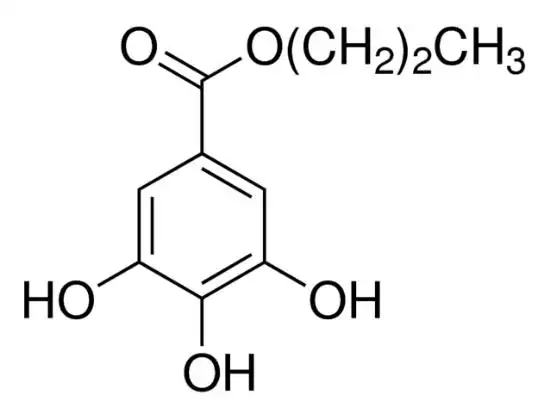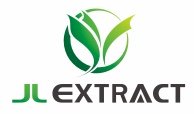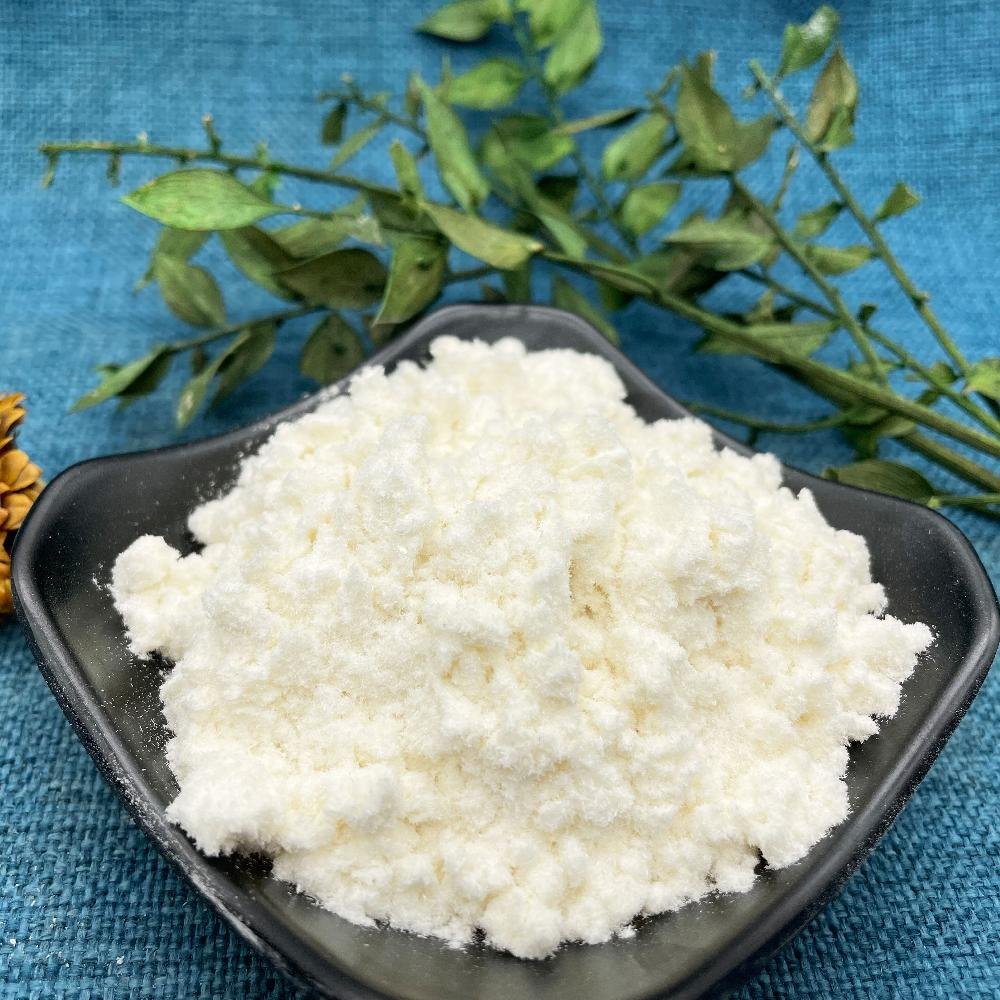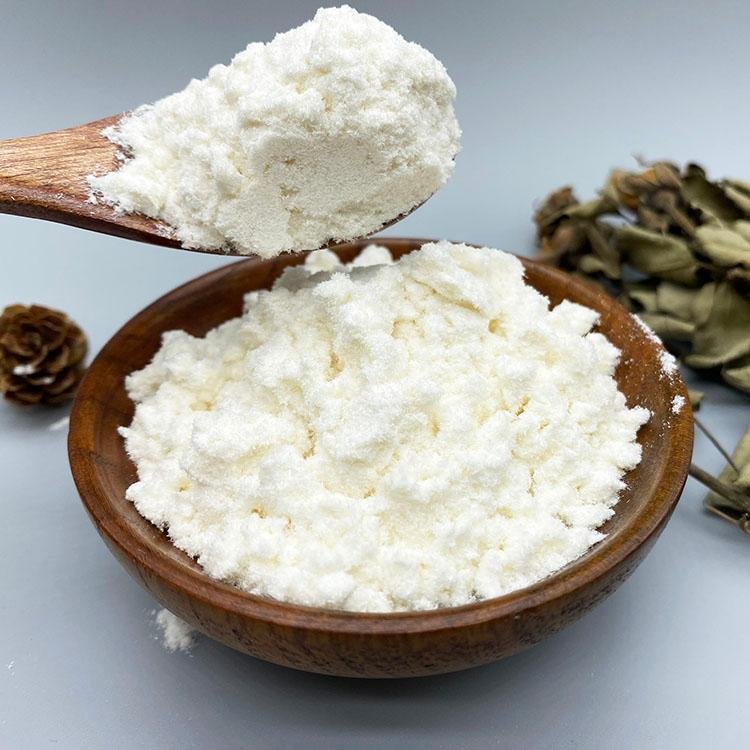Propyl gallate is a synthetic antioxidant widely employed to preserve the quality and extend the shelf life of numerous products. As an ester formed from gallic acid and propanol, it effectively prevents the oxidation of fats and oils, which can otherwise lead to rancidity and spoilage. Found in everything from food items to cosmetics and pharmaceuticals, its utility is undeniable. However, growing concerns about its safety have prompted closer examination of its potential health risks.

Propyl gallate (chemical formula C₁₀H₁₂O₅) is a white, crystalline powder celebrated for its antioxidant capabilities. By neutralizing free radicals, it prevents the oxidative degradation of lipids, ensuring product stability. Its versatility has made it a go-to additive in industries where freshness and longevity are critical. Yet, its widespread use has also sparked questions about its impact on human health, necessitating a deeper dive into its applications and risks.
Common Uses of Propyl Gallate
Propyl gallate is a common ingredient in a variety of everyday products, including:
- Food: It preserves edible oils, margarine, peanut butter, snack foods, and chewing gum by preventing rancidity.
- Cosmetics: Found in lipsticks, lotions, and creams, it maintains texture and prevents spoilage.
- Pharmaceuticals: Used to stabilize active ingredients in medications, ensuring their efficacy over time.
- Industrial Products: Incorporated into lubricants, adhesives, and packaging materials to enhance durability.
The table below highlights some typical applications and their reliance on propyl gallate:
| Product Category | Examples | Purpose of Propyl Gallate |
|---|---|---|
| Food | Margarine, Peanut Butter | Prevents oxidation of fats |
| Cosmetics | Lipsticks, Moisturizers | Maintains product stability |
| Pharmaceuticals | Tablets, Syrups | Preserves active ingredients |
| Industrial | Lubricants, Adhesives | Extends shelf life |
Despite its utility, the presence of propyl gallate in these products has raised safety concerns, particularly regarding its potential to affect human health.
Health Risks of Propyl Gallate
While propyl gallate is approved for use by regulatory agencies like the U.S. Food and Drug Administration (FDA), its safety profile is not without controversy. Below, we examine its harmful effects, side effects, and toxicity, drawing on scientific studies and health guidelines.
Harmful Effects and Side Effects
Propyl gallate has been associated with several adverse effects, particularly in sensitive individuals or at elevated exposure levels. Some of the most notable side effects include:
- Allergic Reactions: Propyl gallate can provoke allergic responses such as skin rashes, itching, or swelling, especially in those sensitive to antioxidants or gallic acid derivatives. A study in the Journal of Allergy and Clinical Immunology documented cases of contact dermatitis linked to its use in cosmetics.
- Gastrointestinal Distress: High doses may lead to nausea, vomiting, or stomach cramps. Animal studies suggest that excessive intake could exacerbate these issues, causing significant discomfort.
- Respiratory Irritation: Though rare in consumer settings, inhalation of propyl gallate dust during manufacturing has been linked to respiratory irritation.
These effects are typically mild and uncommon at standard exposure levels, but they highlight the compound’s potential to cause harm in specific contexts.
Toxicity and Long-Term Concerns
The toxicity of propyl gallate has been debated extensively, with research offering mixed conclusions. Key areas of concern include:
- Carcinogenicity: Some animal studies suggest that high doses of propyl gallate may promote tumor growth, particularly in the liver and thyroid. However, these findings stem from exposure levels far exceeding typical human consumption. The International Agency for Research on Cancer (IARC) has not classified it as a carcinogen due to insufficient evidence in humans.
- Endocrine Disruption: Limited studies, such as one published in the Journal of Applied Toxicology, indicate that propyl gallate may exhibit weak estrogenic activity in vitro. Its relevance to human endocrine health remains uncertain and requires further investigation.
- Organ Toxicity: High doses have been shown to damage the liver and kidneys in animal models. For example, a rat study found that doses exceeding 1,000 mg/kg body weight caused elevated liver enzymes, signaling potential hepatotoxicity.
Importantly, these toxic effects are observed at concentrations well above those encountered in everyday life, suggesting that typical exposure poses minimal risk.
Regulatory Status and Safety Limits
Propyl gallate is deemed "Generally Recognized as Safe" (GRAS) by the FDA, but its use is tightly regulated. Maximum allowable concentrations in food vary by product type, as shown in the table below:
| Product Type | Maximum Propyl Gallate Concentration | Notes |
|---|---|---|
| Edible Oils | 0.02% | Prevents rancidity |
| Chewing Gum | 0.1% | Higher limit due to low intake |
| Baked Goods | 0.001% | Minimal use required |
The European Food Safety Authority (EFSA) has established an acceptable daily intake (ADI) of 0.5 mg/kg body weight per day, ensuring that consumer exposure remains safe. These limits are based on extensive safety assessments and are designed to prevent adverse effects.
Balancing Benefits and Risks
Propyl gallate’s ability to preserve product quality is a significant advantage, but its potential health risks warrant consideration. For the average consumer, exposure levels in food and cosmetics are unlikely to cause harm, aligning with regulatory safety thresholds. However, individuals with allergies or those wary of synthetic additives may prefer to minimize their intake.
Manufacturers could mitigate concerns by exploring natural alternatives like vitamin E (tocopherols) or rosemary extract, which offer comparable antioxidant benefits without the same risk profile. Such substitutions could appeal to health-conscious consumers while maintaining product integrity.



